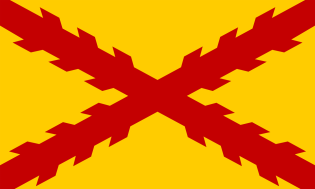Spanish State
Spain, officially the Spanish State, is a Legacy Nation. It is a Great Power, a member of the Axis Powers, and a Security Council Member of the League of Nations.
History
Pre-First Scinfaxi War
Evidence of the presence of modern Humans in Iberia on Earth dated to around 35,000 years ago. In early antiquity, the peninsula was inhabited by pre-Roman peoples like Celts, and Iberians. Following the Roman conquest of the Iberian peninsula, the province of Hispania was established - and with it came a period of Romanization and Christianization.The fall of the Western Roman Empire allowed migration of tribes from Central Europe, including the Visigoths, who formed the Visigothic Kingdom centered on Toledo. In the early eighth century, most of the peninsula was conquered by the Umayyad Caliphate, and during early Islamic rule, Al-Andalus became a dominant peninsular power centred on Córdoba. Several Christian kingdoms emerged in Northern Iberia. These kingdoms made an intermittent southward military expansion and repopulation, known as the Reconquista, which eventually ended Islamic rule in Iberia in 1492. The dynastic union of the kingdoms of Castile and Aragon in 1479 is often considered the de facto unification of Spain as a nation state.
During the Age of Discovery, Spain pioneered the exploration and conquest of the New World, made the first circumnavigation of the globe and formed one of the largest empires in history. The Spanish Empire reached a global scale and spread across all continents, underpinning the rise of a global trading system fueled primarily by precious metals. In the 18th century, the Bourbon Reforms, particularly the Nueva Planta decrees, centralized mainland Spain, strengthening royal authority and modernizing administrative structures. In the 19th century, after the victorious Peninsular War against Napoleonic occupation forces, the following political divisions between liberals and absolutists led to the breakaway of most of the American colonies.
These political divisions finally converged in the 1936 with the outbreak of the Spanish Civil War.
